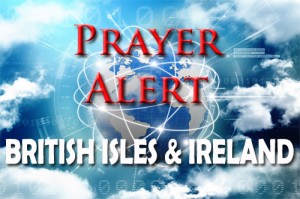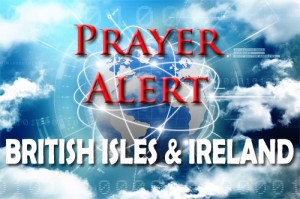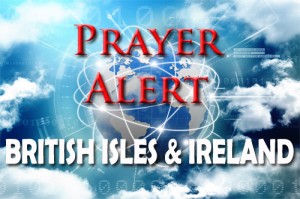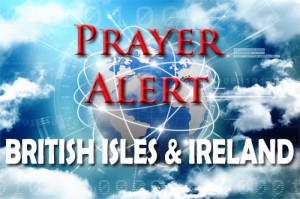
David Fletcher
David Fletcher is Prayer Alert’s Editor.
He is part of a voluntary team who research, proof-read and publish Prayer Alert each week.
If you would like to make a donation towards our running costs, please click here.
‘Nawaz Sharif has been ousted from government several times, but he has returned to Pakistan, leaving his wife in an English hospital dying of cancer. The High Court ousted him on corruption charges, and he is banned from taking any political office; but his party (the major party) have changed the parliament’s constitution so that Nawaz can become its president. They also passed a stricter Islamic law, making it much harder for Christians and other minorities. The present temporary prime minister has little backing. There is no control in the country. Terrorists are crossing back and forward across the border. When US secretary of state Rex Tillerson came to meet Pakistan’s military on the Afghan situation, he was undercut by Pakistan’s government who demanded that he speak to it only. The military is held in favour by much of the populace.’
There are seven million Jehovah’s Witnesses in North America and Europe. They believe that Jesus is an inferior being, the Holy Spirit is simply a force of Jehovah, and that Jesus was resurrected in spirit, not in body. They trace their origin to Charles Taze Russell who believed that Christ’s second coming occurred in 1874. He spread his ‘New World Translation’ of the Bible and the Watch Tower magazine. Russell’s groups took the name Jehovah’s Witnesses in 1931 to reflect their proselytizing focus. Though Witnesses identify themselves as a part of Christianity, many Christians consider them a cult, associated with occasional inconvenient knocks on the door or groups on street corners offering literature. But they are God’s beloved, beautiful creations who are in need of the truth of Jesus Christ.
The country’s leaders of different denominations say Zimbabwe is between a crisis and a kairos opportunity. They are calling for prayer for, peace, respect for human dignity, a transitional government of national unity, and national dialogue. Their statement said, ‘The nation’s challenge is one of a loss of trust in the legitimacy of national processes. There is a strong sense that the hard-earned constitution is not being taken seriously. The wheels of democracy have become stuck in the mud of personalised politics where the generality of the citizenry plays an insignificant role, but we see the current arrangement as an opportunity for the birth of a new nation.’ The World Council of Churches is asking churches around the world to pray for Zimbabwe to embrace change and move forward without vengeance.
The village where 305 worshippers were killed by Salafi militants on 24th November had been warned against hosting Sufi gatherings. Salafi Muslims follow an ultra-conservative Islam and believe Sufis are heretics. This attack, the worst in Egypt’s history, was the security forces’ second failure in five weeks, following 50+ policemen being killed in a Muslim Brotherhood militants’ hideout. After that incident President el-Sisi demoted his army chief of staff. Washington told el-Sisi that the Egyptian security forces’ preparedness was clumsy and predictable, saying that in the fight against terror and guerrilla groups quicker action is needed, combining precise intelligence and commando forces. The Egyptians are still very far from employing advanced methods; they responded to the attacks by bombing IS vehicles.
Sony’s new animation picture, The Star, was released on 17 November. The film’s director said they are preparing for the movie to be this generation’s Christmas classic. It is the first faith-based animation film to hit cinemas since Prince of Egypt in 1998. The director added, ‘We’re living in divisive and stressful times, and we read about violence continually. The power of this story is - many people from different walks of life. The “three kings” are upper-class foreigners, and the local shepherds are the bottom of the working class, making note that Jesus brought people from all walks of life together. The Star is “the greatest story never told”’.
Jack Phillips, a Christian bakery owner, is appealing a recent ruling against him after a complaint filed by a gay couple who sought a wedding cake from him - but he refused because of his religious beliefs. His case will be heard before the US supreme court in December. He is receiving support not only from Christians but also from many in the gay community who have spoken out in support of his religious freedom rights. One video says, ‘I'm TJ, and I'm Matt; we're gay and we're here to support Jack Phillips, to buy stuff from him, and support him because we don't think any artist should be forced to create for something that violates their beliefs’. The video was posted by Alliance Defending Freedom, the conservative legal firm defending Phillips.
Power is a vital tool in mobilising the Church. Jesus demonstrated ‘power through weakness’. Yet the Kingdom, power and the glory are his. God made us joint heirs with Christ. Love so amazing, he left his Holy Spirit for the tasks ahead. We have hope and are assured to do greater works than Jesus, so that God will be glorified.
(Danielle Fetuga-Joensuu, Prison Hope)
At the second of eight late-night Commons sittings on the EU Withdrawal Bill, on 15 November, proposals were put forward for transposing EU law onto the UK statute book after Brexit. The expected backbench rebellion did not happen, but similar issues will be debated again in coming weeks. It appears that the problems arise from the same challenge (how Government approaches and drafts legislation). Pray for the Prime Minister, ministers, civil servants, and advisors to have supernatural support and strength to complete the task ahead in God’s timing, and not go in ever-decreasing circles to achieve answers and agreements. Pray for the ministers to follow God’s template for the transition. May all government departments have Kingdom answers and God’s approval as they face the depth and scope of the task ahead.
(Linda Digby, Prayer Alert)
Following last week’s PA article, ‘Foreign secretary’s blunder’, regarding Boris Johnson and Nazanin Zaghari-Ratcliffe’s imprisonment in Iran, continue to pray for this situation. Her husband Richard Ratcliffe has met Mr Johnson and hopes to travel with him to Iran; he said the ‘softly softly’ approach is not working. Pray for them to have a safe passage to Iran in the near future. It has been reported that Britain is preparing to pay a decades-old £450 million debt to Iran in a diplomatic effort at improving Nazanin’s chances of release. Pray that Mr Johnson can use fresh negotiation methods which will be acceptable to the Iranians. Pray for further anointing and wisdom for all the staff preparing for these negotiations. Pray for Richard Ratcliffe, and all assisting him, to have patience and peace and for God to hold Nazanin close to Him and heal her emotional, physical and spiritual wounds.
A Christmas advert by Tesco, showing a Muslim family celebrating by exchanging presents and cooking Christmas dinner, has divided shoppers. One comment was, ‘Muslims don't believe the truth of Christmas, and Tesco doesn't even have a halal turkey for them’; another, ‘The advert is inclusive and promotes diversity’. Some are crying ‘racism’, but others say, ‘It has nothing to do with racism, it is to do with religion. Christian festivals such as Advent, Christmas, Easter and Whitsun proclaim our nation’s Christian heritage’. See also










